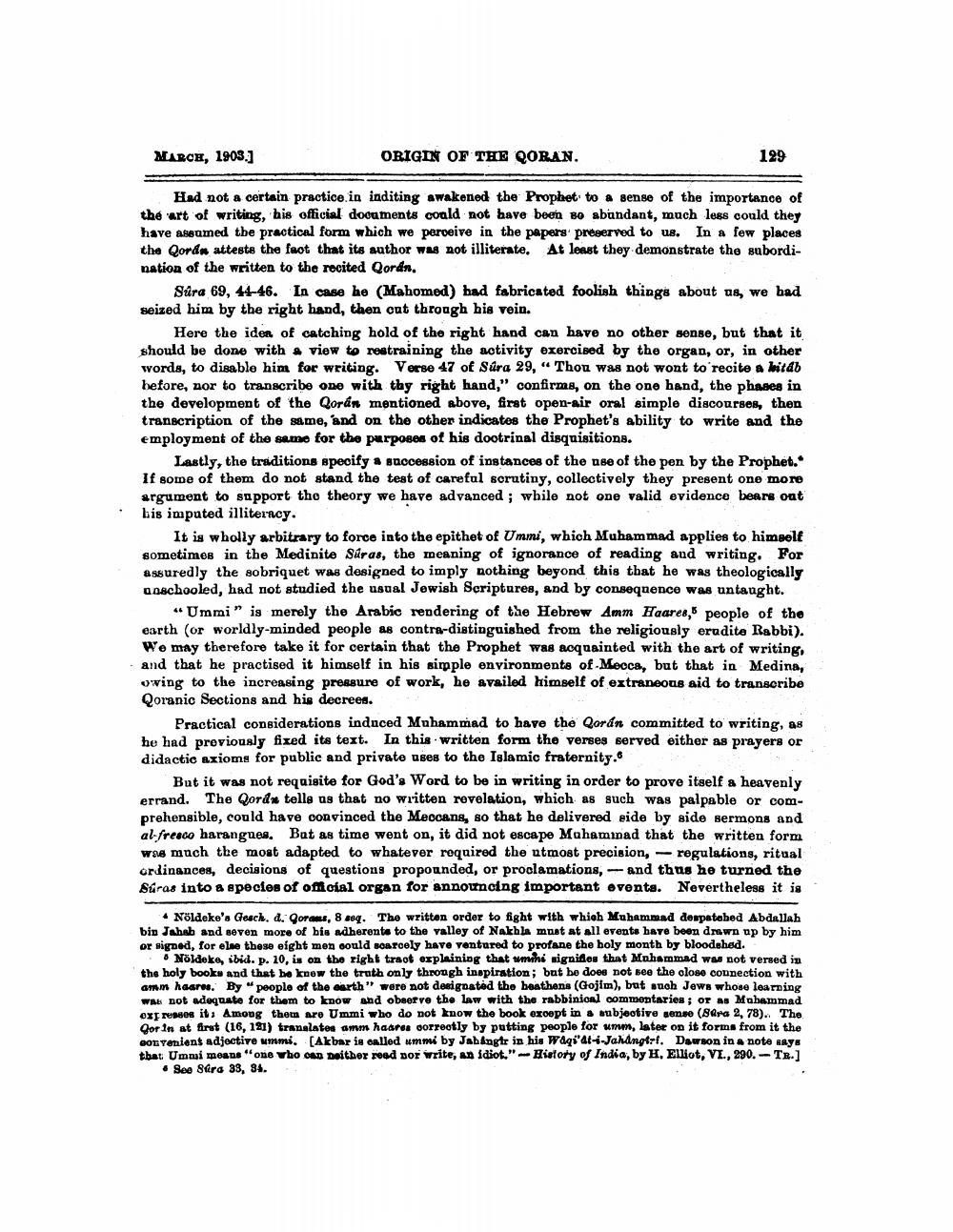________________
MARCE, 1903
ORIGIN OF THE QORAN.
129
Had not a certain practice in inditing awakened the Prophet to a sense of the importance of the art of writing, his official documents coald not have been so abandant, much less could they have assumed the practical form which we perceive in the papers preserved to us. In a few places the Qordn attests the faot that its author was not illiterate. At least they demonstrate the subordination of the written to the recited Qordn.
Súra 69, 44-46. In case he (Mahomed) had fabricated foolish things about us, we had seized him by the right hand, then cat through his vein.
Here the idea of catching hold of the right hand can have no other sense, but that it should be done with . view to restraining the activity exercised by the organ, or, in other words, to disable him for writing. Verse 47 of Súra 29, “ Thou was not wont to recite a kitab before, nor to transcribe one with thy right hand," confirms, on the one hand, the phases in the development of the Qorán mentioned above, first open-air oral simple discourses, then transcription of the same, and on the other indicates the Prophet's ability to write and the employment of the same for the purposes of his dootrinal disquisitions.
Lastly, the traditions specify a Baccession of instances of the use of the pen by the Prophet. If some of them do not stand the test of careful scrutiny, collectively they present one more argument to support the theory we have advanced ; while not one valid evidence bears out bis imputed illiteracy.
It is wholly arbitrary to force into the epithet of Ummi, which Muhammad applies to himself sometimes in the Medinite Súras, the meaning of ignorance of reading and writing. For assuredly the sobriquet was designed to imply nothing beyond this that he was theologically Anschooled, had not studied the usual Jewish Scriptures, and by consequence was untaught.
"Ummi” is merely the Arabic rendering of the Hebrew Amm Haares, 5 people of the earth (or worldly-minded people as contra-distinguished from the religiously erudite Rabbi). We may therefore take it for certain that the Prophet was acquainted with the art of writing, and that he practised it himself in his simple environments of Mecca, but that in Medina, oping to the increasing pressure of work, he availed himself of extraneous aid to transcribe Qoranic Sections and his decrees.
Practical considerations induced Muhammad to have the Qorán committed to writing, as he had previously fixed its text. In this written form the verses served either as prayers or didactic axioms for public and private uses to the Islamic fraternity.
But it was not requisite for God's Word to be in writing in order to prove itself a heavenly errand. The Qords tells us that no written revelation, which as such was palpable or comprehensible, could have convinced the Meccang, so that he delivered eide by side sermons and al-fresco harangues. But as time went on, it did not escape Muhammad that the written form we much the most adapted to whatever required the utmost precision, -regulations, ritual ordinances, decisions of questions propounded, or proclamations, and thus he turned the Saras into a species of official organ for announcing important events. Nevertheless it is
Nöldeke's Gesch, d. Gora, 8 seq. The written order to fight with which Muhammad despatabed Abdallah bin Jahab and seven more of bis adherents to the valley of Nakhle must at all events have been drawn up by him or signed, for elee these eight men could scarcely have ventured to profane the holy month by bloodshed.
Nöldeke, ibid. p. 20, is on the right traot explaining that wmihi signifies that Muhammad was not versed in the holy books and that he know the truth only through inspiration; but he does not see the close connection with amm haaras. By people of the earth" were not designated the beathens (Gojim), bat auch Jews whose learning was not adequate for them to know and observe the law with the rabbinion commentaries ; or as Muhammad OXFrases it. Among them are Ummi who do not know the book except in a subjective sense (Sera 2, 78). The Gorin at first (16, 121) translates amm haaras correctly by putting people for wom, later on it forms from it the BOLTeniens adjective ummi. (Akbar is called ummi by Jahangtr in his W&qidt-Jahangtri. Dawson in a note rays that Umni means "one who can neither read nor write, an idiot." - History of India, by H. Elliot, VL., 290.-TR.]
. See Sara 83, 84.




